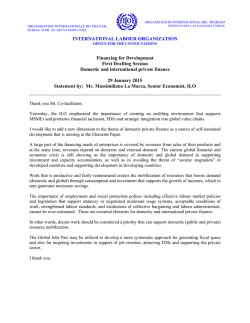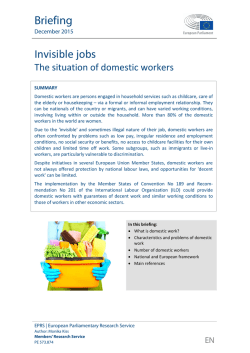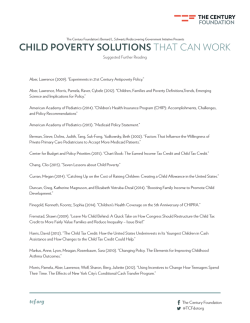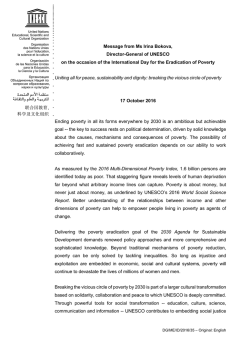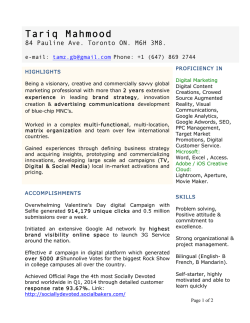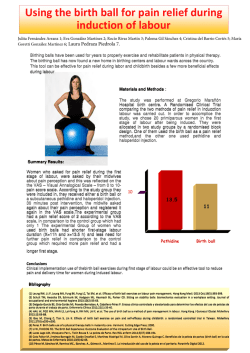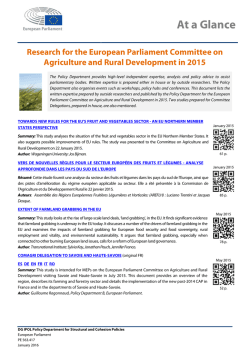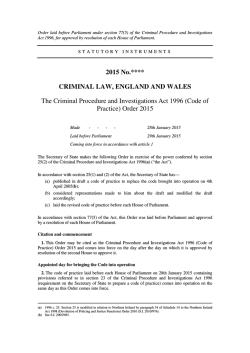
Speech: Trade, Development and Fairness
European Commission – Speech – [Check against delivery] Trade, Development and Fairnes 27 January 2015 Cecilia Malmström, Commissioner for Trade Local and Regional support to Fair Trade: links with the EU Trade Agenda Ladies and gentlemen, Fair trade is a very important topic and I'm delighted to be with you this evening. Thank you to the European parliament and to the city of Göteborg for organising this. Fair trade is a subject close to my heart and it touches on one of the core political issues in my new portfolio: how does trade impact people in developing countries? It's not a simple question to answer. The starting point must be that trade reduces poverty. We can deservedly congratulate ourselves on the success of the Millennium Development Goals, and in particular its poverty reduction target. But we also know that the Asian economic miracle, led by China, was decisive in that achievement. And we know trade was decisive in achieving that economic miracle. We also know that this is not the first time export led growth has been successful. Before China came the four Asian tigers and before them came Japan – all countries where exports to the developed world fuelled prosperity. What these older stories also show us is that trade-led growth also leads to improved living and working conditions over time. We are seeing this again now as wages in China rise - at an official average of 12% between 2000 and 2010. This is the fundamental logic. That trade can help people improve their standard of living over time. And this is why the European Union sees trade as an essential part of our strategy to encourage economic development around the world: We give developing countries preferential access to our 500 million-consumer market, focusing those preferences on countries most in need under the Generalised System of Preferences, or GSP. Furthermore, the new generation of Economic Partnership Agreements we are putting in place with a wide range African, Caribbean and Pacific countries provide full access to the European market and also, very gradually and carefully, bring the benefits of increased competition to our partner countries. And, for the 50 poorest countries in the world, access to the EU is free of any duties or quotas. All of this, on top of our already generally open market, helps explain why the European Union is the most open market in the world for developing country exports. Fuels excluded, the EU imports more from developing countries than the USA, Canada, Japan and China put together. *** But to properly address the development challenge, the European Union must do more than just open our market, for two reasons – one political and one economic. The political issue is that, to many Europeans, the problem of global inequality requires more urgent action than the long time-lines of deep economic change. Trade directly connects us – today, right now – to people in developing countries that are producing goods that make up the fabric of our daily lives. Every one of us today has used a product made, at least to some extent, by someone who is much less well off than ourselves. Maybe it's your phone, maybe it's a cup of coffee, maybe your winter coat. Europeans are aware, via traditional and social media, about the conditions in other countries. And we have polls showing that they are willing to pay more for products from developing countries. That direct connection appeals to the core European value of equality of opportunity. It creates a strong political case to do more than just wait for development to happen. The economic case for doing more is also compelling. We know that we cannot build development by tearing down barriers alone. To make markets work properly: People need education, training and expertise. They need to be healthy, with good access to food, water and medical care. They need fair and clear laws that are fairly and clearly enforced… with no special treatment for those who can afford to bribe their way to personal advantage! And they need good physical infrastructure to get their products to the market and to distribute the benefits. For these political and economic reasons, the European Union's trade policy does more for development than just opening markets. For example, we are pushing to have strong provisions on sustainable development in all of our free trade agreements. They are already in force in our deals with South Korea, Central America, Colombia and Peru. And will also be part of our future agreements. They require both sides – the EU and our partner country – to respect, implement and enforce a series of core international standards on labour rights and the environment. They also contain commitments on the prudent use of natural resources such as timber and fish, and the promotion of practices such as corporate social responsibility. These commitments are backed up by a dedicated and binding process for arbitration and a mechanism to ensure civil society groups keep us, as governments, accountable. The European Union also does more than just opening markets through the GSP+ scheme. Under those rules, the EU gives special tariff cuts to developing countries that commit to core international agreements on human and labour rights, the environment, and good governance. Thirteen countries are now covered. Finally, we have also taken two specific initiatives that support greater fairness in trade: Following the Rana Plaza tragedy, the Commission, agreed a Compact with the government of Bangladesh, the United States and the International Labour Organisation for the improvement of labour rights and working conditions in Bangladesh's ready-made garments industry. Trade unions, business and NGOs are also contributing substantially to this work. The work is far from over but Bangladesh's garment workers are overall better off today than a year ago. 2 The Commission has also made a proposal for legislation that would promote responsible sourcing of minerals from conflict areas like the African Great Lakes region. And I look forward to working with Parliament in the coming months to find agreement so we can get it into practice. *** If we are to be successful, however, we also need to look beyond a narrow definition of trade policy to address issues of trade fairness. As a starting point, that means making sure our work is properly coordinated and fully compatible with the EU's wider development policy. The Commission's collegial system – along with Parliament's own procedures – have always supported this kind of coordination. But the innovations that President Juncker has brought to the way we work will help us do that even better. I meet every month with all the other Commissioners responsible for External Action, where we discuss a wide range of foreign policy questions. And one of the issues we will be working on closely is the EU's input to the next phase of the United Nations sustainable development goals post-2015. It's also through close cooperation between trade and development policies that the EU provides aid for trade. The EU and Member States together account for a third of all aid for trade. We provided 2 and a half billion euro, or 60% of all trade-related assistance – a narrower aid category focused more on trade capacity building. This funding helps put in place the conditions that will allow developing country producers to really take advantage of demand outside their borders. That can mean helping streamline border crossings, providing better infrastructure links or building capacity to meet rigorous EU food safety or technical standards. *** Now back to the specific topic of this event's debate. Fair trade. The EU's approach to fair trade is grounded in these wider efforts to make sure that people in developing countries really benefit from trade with Europe. The EU supports the fair trade movement. First because it is based on a principle that trade can be a huge positive force for good. Second because the fair trade principles understand the need for the right infrastructure and conditions to make sure people benefit. And third – and most importantly – because it delivers actual results. Take the case of Meru Herbs in Kenya. It started out as an irrigation project, and is now a thriving organisation, exporting teas, herbs, chillies and sauces around the world, all based on its commitment to empowering women, alleviating poverty and improving the standard of living in a small community in central Kenya. Or take the Cooprobata cooperative of banana producers in the Dominican Republic, which sells its products in several Swedish fair trade stores. The fair trade minimum price and premium mean higher wages for workers, which has helped reduce child labour since parents can afford to keep children in school. These are some of the examples of what the roughly three billion euro in fair trade sales in the European Union do in real terms. 3 The EU has supported the fair trade movement for many years. The first communication from the Commission on the issue dates from 1999. Our current approach dates from 2009. It recognises the rapid development of goods certified "Fair Trade" in Europe and how fair trade and other private schemes support sustainable development. It also backs the movement's private sector approach, which allows it to respond quickly to changes in consumer and producer preferences. That is why the Commission prefers to keep out of the business of ranking different types of schemes, since that would get in the way of the movements' own dynamism. But what the Commission has been able to do is act on two fronts. First, on public procurement. For a long time local authorities like the Goteborg region, as well as national governments, lacked clarity on whether they could favour fair trade products in their purchases. This issue is now well on its way to being solved. The revised public procurement directives were adopted by Parliament just two weeks ago. They make clear that contracting authorities can consider environmental and social aspects in their award decisions, as long as this is done in an objective, non-discriminatory way. Second, through development cooperation. We support fair trade, cooperatives and smallholder farmers in developing countries and awareness-raising and educational programmes within the EU. For example the EU has donated €2 million to a fair trade supply chain project in India and Nepal. The project benefitted 300 fair trade groups in the garment sector, who provide opportunities for about 30,000 people, most of them women. We are also supporting the creation of a consumer market for fair trade products within India, helping to build environmentally sustainable production and consumption and reducing poverty for poor farmers and handicraft producers. The project has helped triple fair trade sales in four project cities from three and a half to over ten million euro. It has also trained 7,000 smallholders on sustainable farming methods. In addition, fair trade organisations are also actively participating in the implementation of the sustainable development chapters of our concluded FTAs such as those with Central America, Columbia and Peru and Singapore. And this is just the beginning. So considerable work is already being done and I believe the Commission should continue in this direction. We are now in the process of formulating our trade priorities for this mandate and I would welcome your ideas on how to move forward in the area of fairer trade, looking at the whole value chain. It is also clear that some key levers are probably found in other policy areas – like development and the internal market as we have seen, or indeed at the local government level. I am very encouraged that Goteborg and so many other regions, cities and towns across Europe are actively engaged in the promotion of fair trade. Much can be done at local and regional level too and the EU should continue encouraging initiatives in this respect. Nonetheless, one area that we in the trade community are interested to explore further is the whole question of responsible sourcing by companies. It's a theme that already unites both our conflict minerals proposal and the Bangladesh compact. So chairman, thank you again for inviting me. I am looking forward to hear more tonight on fair trade and different examples. Thank you very much for your attention! 4
© Copyright 2026
